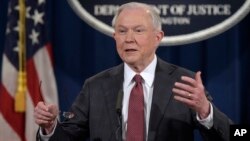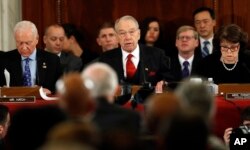U.S. Attorney General Jeff Sessions on Monday defended his conduct at a January confirmation hearing where he denied having contacts with Russian officials during the course of the presidential campaign when he was an adviser to Donald Trump.
“My answer was correct,” Sessions, who last week said he would stay out of any probe into alleged Russian interference in the 2016 presidential election, wrote in a letter to Senate Judiciary Committee Chairman Chuck Grassley.
Sessions repeated that he spoke to Russian Ambassador Sergei Kislyak during the Republican National Convention in Cleveland in July, and again at his Senate office in Washington in September.
At a news conference on Thursday, Sessions said he should have said during the confirmation hearing that he had met with the ambassador in his role as a senator.
The Washington Post first disclosed the meetings on Wednesday.
Many Democrats, who are pushing for a broad probe of ties between Trump campaign associates and Russian operatives, have called for Sessions to resign. Sessions, then a U.S. senator from Alabama, was a high-ranking player in Trump's 2016 campaign.
Sessions responds in letter
Sessions' denial of contacts with Russians had come in response to a question by Democratic Senator Al Franken about what he would do if reports of contacts between Trump associates and Russians were true.
“I did not mention communications I had had with the Russian Ambassador over the years because the question did not ask about them,” Session wrote in the letter to Grassley, which he said was meant to supplement his January testimony.
Sessions said his recusal would apply not just to any alleged Russian contact with the Trump campaign, but also with the Trump transition team and administration.
“This should not be taken as any evidence of the existence of any such investigation or its scope," he added.
Trump backs Sessions
The Republican president has backed his attorney general and accused Democrats of blowing the issue out of proportion for political purposes.
U.S. intelligence agencies concluded last year that Russia hacked and leaked Democratic emails during the election campaign as part of an effort to tilt the vote in Trump's favor. Russia has denied the allegations.






